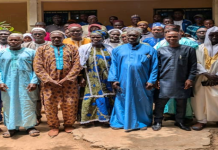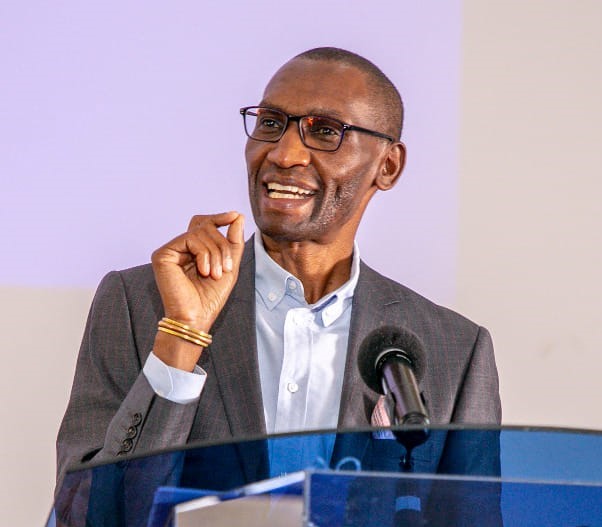By Chege Ngugi, Africa Regional Director, ChildFund International
Fatou Bensouda – a name that is loved across the world. She is celebrated as the first African woman to serve as Chief Prosecutor of the International Criminal Court (ICC) in The Hague. She is deeply admired, not only in The Gambia, her home country but throughout Africa, serving as a great inspiration. Her achievements remind us of the boundless potential that girls possess when provided with opportunities.
However, I find myself pondering: Would she have reached such heights without access to education? What if she had dropped out of school or succumbed to pressure for early marriage?
I’ve been following the ongoing discourse in The Gambia regarding the government’s ban on Female Genital Mutilation/Cutting (FGM/C). While much of the debate has revolved around the cultural and religious aspects of the practice, it’s crucial to also examine its significant socio-economic impact.
Regardless of one’s position on FGM/C, we all want economic prosperity. We all desire financial stability for our children, families, and the nation. No one enjoys begging or sleeping hungry. Therefore, any initiatives we undertake, as individuals or as a society, should contribute positively to our collective growth and development. Let’s take a moment to reflect on whether FGM/C aligns with this objective, and if it contributes at all.
Firstly, it’s widely acknowledged that FGM/C has a detrimental effect on the educational opportunities of girls and women. UNICEF research indicates that girls who have undergone the procedure are three times more likely to abandon their schooling compared to those who haven’t. This can be attributed to various factors, including the physical and psychological trauma inflicted by the practice, as well as the cultural perception that girls who have undergone FGM/C are more desirable for marriage. What happens to most girls who are uneducated, they cannot secure well-paying jobs or run thriving businesses. A lack of education severely limits girls’ capacity to pursue skilled employment opportunities and achieve financial independence.
According to the World Bank, women lacking formal education earn 50% less than men, while those with only a secondary education earn 75% less.
When girls are educated, they are better equipped to secure higher-paying jobs, contribute to their families’ incomes, and break the cycle of intergenerational poverty. Just like Fatou Bensouda, an educated girl can achieve the unexpected. By denying girls access to education through FGM/C, we are killing the dreams of many more Fatous in the making and in the long run slowing Gambia’s socio-economic development.
Secondly, FGM is associated with high healthcare expenses due to complications arising from the procedure. These complications include severe pain, infections, hemorrhaging, and in extreme cases, fatalities. Moreover, women who have undergone FGM face heightened risks of complications during childbirth, such as obstructed labor and fistula.
We’ve all heard of girls who have suffered from dire health complications after undergoing FGM, not only in The Gambia but across Africa and the world. Most recently, in January, this year, three girls died after undergoing the procedure in neighboring Sierra Leone. How many girls do we want to lose before we can accept that this practice is torture in its rawest form?
Whenever I hear older women who underwent the cut narrating their experience, none describe it as an ‘amazing’ or ‘exciting’ experience that they would love to relive again. Their stories are always laced with pain and horror. How a girl was pinned down by older women, cut, bled and fainted in the process. These stories are always horrific. Should we air these stories on TV and radio all day for people to accept that FGM/C is a dangerous and archaic practice that has no place in the 21st century? Why should we harden our hearts and be blind to the pain of our daughters?
But what troubles me even more is the fact that decisions about a girl’s body are often made by men, whether they be fathers, uncles, husbands, or community leaders. Why is it that women’s bodies are seen as something to be controlled and regulated by men? Why is it that decisions about a girl’s physical integrity are made without her consent, often at a young age when she is not even allowed to speak up for herself? This is not just a Gambian issue; it is a global issue that requires urgent attention and action.
By putting an end to FGM/C, we can mitigate these healthcare expenses and advance improved health outcomes for women and girls. This imperative extends beyond morality; it’s also an economic necessity. According to the World Health Organization (WHO), the annual cost of treating FGM-related complications in just 10 African nations amounts to a staggering $1.4 billion. This financial burden diverts resources that could otherwise be allocated to vital sectors such as education, infrastructure, and housing. Given the many challenges already facing our continent, why should we create more problems? In The Gambia, where healthcare resources are already scarce, the additional strain of FGM-related healthcare costs further burdens an already overstretched system. These funds could be redirected to meet more urgent healthcare needs, such as maternal and child health services or combating infectious diseases.
Cultural practices should never be a justification for the violation of human rights. As stated in the February communique from the UNFPA-UNICEF and partners’ National FGM Conference, this practice violates fundamental human rights, perpetuates gender inequality, and causes immense physical and psychological harm.
The conference further called for collective action to end FGM, outlining commitments such as enforcing laws prohibiting FGM, raising awareness, providing healthcare and support services for survivors, engaging communities, and enhancing cooperation and coordination efforts. This is why at ChildFund, we are committed to working with all players, especially communities, to engage in dialogue and create awareness on the dangers of this practice. We must help people understand that girls are children too, entitled to a life free from violence and discrimination and deserving of the opportunity to reach their full potential.
Civil society organizations, including ChildFund, play a crucial role in raising awareness, providing education, and advocating for policy change. We must stand united, with one voice, in our resolve to keep FGM/C banned, advocating for education and change within communities to replace fear and tradition with understanding and empowerment.
Above all, I appeal to the members of The Gambia’s National Assembly to recognize the gravity of their duty. Your decisions today will be scrutinized by history, you will be judged harshly. Your actions must align with justice and progress. Reversing the ban on FGM/C would signify a regression to a time when the health, rights, and dignity of girls and\ women were disregarded. As lawmakers, you wield the authority to advocate for the rights of all children to exist free from harm. I urge you to cast your votes in defense of our daughters, future mothers and leaders.
Moreover, by ending FGM/C, we send a powerful message to the international community that The Gambia is committed to upholding human rights and promoting gender equality. This can attract investment, promote economic partnerships, and enhance the country’s global reputation as a progressive nation.
We must act now to secure a brighter future for the girls and women of The Gambia. Let’s unite and support efforts to end this harmful practice – once and for all.






















